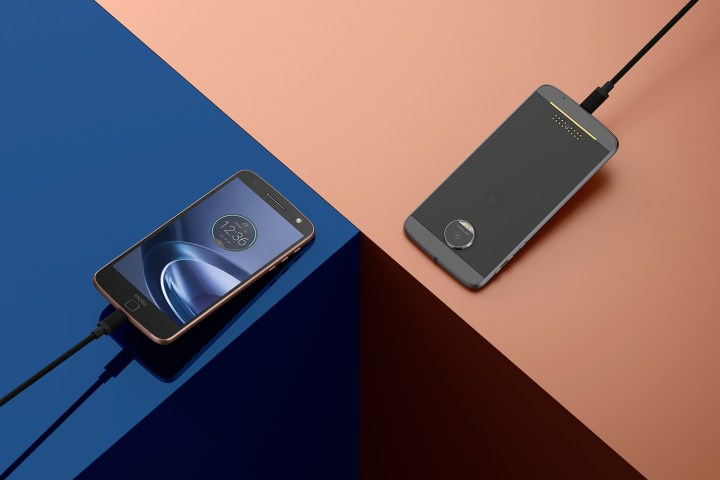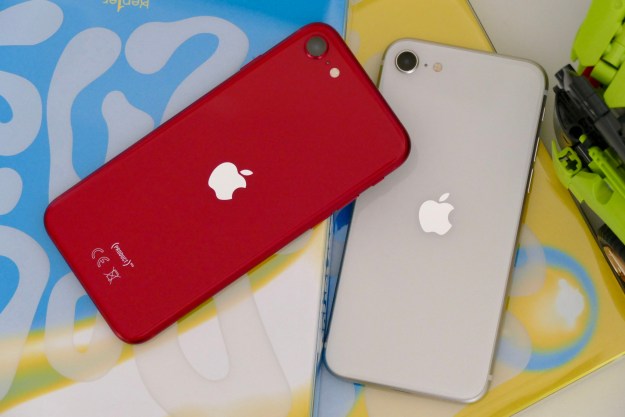
Both of Lenovo’s new Motorola flagship phones — the Moto Z and Moto Z Force — are Verizon exclusives in the United States. If you don’t yet know about the new Moto Z phones, let us just say that they’re pretty awesome. They have top-of-the-line processing power and are compatible with special ‘Moto Mod’ attachments that add new features like a 70-inch projector, a bigger speaker, and a 22-hour battery boost.
If you want a phone, you should be able to buy it from any carrier, unlocked.
The exclusive for the Moto Z will thankfully end later this fall, but the Moto Z Force is chained to Verizon in the U.S. … forever. If you’re not on Verizon, this sucks. The Moto Z Force is, by far, the Moto phone you’ll want to buy. It has a better camera, bigger battery, and a shatter-proof screen packed into the same sexy, modular form factor as the standard Moto Z. It’s the best of all the Moto Zs. And now only Verizon users can buy it. We are not pleased.
Carrier exclusives are draconian measures from the early 2000s, not the stuff of modern day smartphone sales. If you want a phone, you should be able to buy it from any carrier, and it should be unlocked. More than that, you should be able to take that phone and use it on any other carrier you want. It’s about time we start recognizing phones as essential pieces of tech. Would you accept a laptop that could only connect to Comcast Wi-Fi? No, you would not.
More Moto: Motorola slims down with the Moto Z, then fattens back up with snap-on Mods
They’ve tapered off, but carrier exclusives continue. The Samsung Galaxy S7 Active, which we love, is only available at AT&T. And now, the Moto Z Force suffers the same fate. Other phones like those from Samsung are still impossible to find unlocked when they launch, though thankfully, most major phones are at least available on every carrier (with some exceptions).
Carrier exclusives are bad for consumers and they’re bad for manufacturers. They’re bad business for everyone except, you guessed it, wireless carriers themselves. AT&T and Verizon love to strong arm companies into exclusives, especially when the company in question doesn’t have much brand recognition or bargaining power in the U.S. Often, these lesser known companies are left with two options: either never sell your phone in the U.S., or sign up to a carrier exclusive.
When a company decides to accept the exclusivity agreement, it’s both a blessing and a curse. On one hand, it’s good, because they’ve breached the most difficult market in the world — the U.S. smartphone market — but on the other hand, they’ve shot themselves in the foot, because now a large number of would-be buyers cannot buy their phones. Carriers have companies like Lenovo, Huawei, and others at a major disadvantage and the end result is a monopoly.
So much for the idea that competition drives American capitalism. Apparently, the only competition carriers like to allow is between each other.
Although it’s great that the Moto Z will eventually be available unlocked, it’s a real shame that other carriers and non-Verizon customers don’t have equal access to it in the States. Verizon will undoubtedly offer financing and bundle some of the cool module Mods with the phone as a promotion, but you may or may not get those same perks when you buy an unlocked Moto Z in the fall.
It’s also unlikely that the Moto Z will have the kind of success or attention in deserves in the U.S. without broad carrier support. Most Americans just don’t buy unlocked phones.
It’s time to put an end to carrier exclusives and the abuse of power these carriers wield over smartphone makers and buyers.
Agree with me? Tell the world by tweeting #FreeTheMotoZ!


